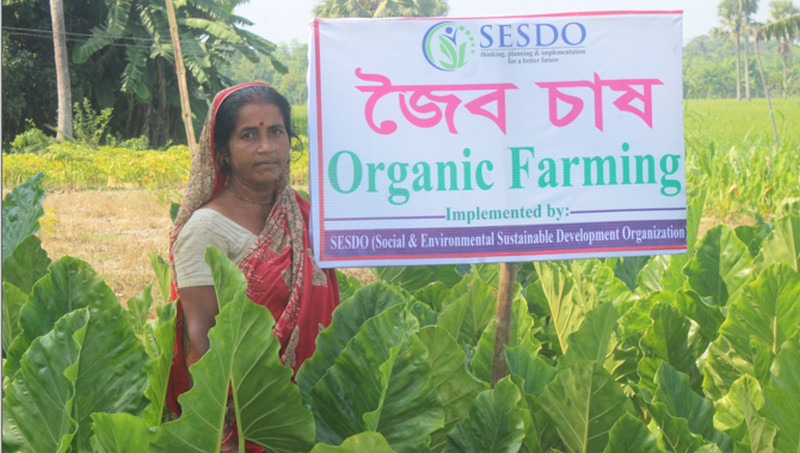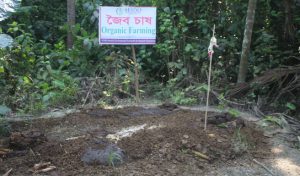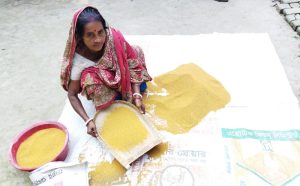Project Name: Organic Farming

Introduction:
Crops grown in a completely natural manner without the use of any artificial fertilizers, chemicals etc. are called organic farming. Therefore, organic farming is a system of agriculture where all types of agricultural crops, such as – grains, pulses, oilseeds, milk, poultry, meat, cotton, jute, Food produced from vegetables, flowers and agricultural crops are organically grown. The use of organic fertilizers prolongs soil fertility Produced crops are healthy and safe because organic farming avoids the use of chemical fertilizers, pesticides, herbicides, etc.  Organic crops contain less than a quarter the amount of pesticides than conventionally fertilized crops, contain fewer toxic metals, and therefore contain much higher levels of anti-cancer antioxidants. In organic farming, manure, cow dung, animal manure, organic waste and organic pesticides and disinfectants are used more. There is indiscriminate use of chemical fertilizers and pesticides to get more crop yield. Farmers are also totally dependent on these and use them almost in all seasons as good yield is not available without balination i.e. using pesticides. As a result of excessive use of pesticides, the balance of the environment is destroyed, the quality of the soil is destroyed, the plants and crops are greatly affected, and the imbalance of biodiversity is not excluded. Among the pesticides, insecticides are again widely used because of their availability and familiarity with the insect for a long time. Climate change has changed the total agricultural system. Various regional activities have been undertaken in Bangladesh to deal with this changing situation. Changes are being made in the farming system through various projects and programs. Region wise implementation of various crop cultivation technology strategies is recommended. SESDO through this project is determined to create awareness about the benefits of organic farming among the people of the rural farming community.
Organic crops contain less than a quarter the amount of pesticides than conventionally fertilized crops, contain fewer toxic metals, and therefore contain much higher levels of anti-cancer antioxidants. In organic farming, manure, cow dung, animal manure, organic waste and organic pesticides and disinfectants are used more. There is indiscriminate use of chemical fertilizers and pesticides to get more crop yield. Farmers are also totally dependent on these and use them almost in all seasons as good yield is not available without balination i.e. using pesticides. As a result of excessive use of pesticides, the balance of the environment is destroyed, the quality of the soil is destroyed, the plants and crops are greatly affected, and the imbalance of biodiversity is not excluded. Among the pesticides, insecticides are again widely used because of their availability and familiarity with the insect for a long time. Climate change has changed the total agricultural system. Various regional activities have been undertaken in Bangladesh to deal with this changing situation. Changes are being made in the farming system through various projects and programs. Region wise implementation of various crop cultivation technology strategies is recommended. SESDO through this project is determined to create awareness about the benefits of organic farming among the people of the rural farming community.
Project Duration
This initiative, which Sisdo began in 2018 with an eye toward human wellbeing, is still in progress.
Project Location

Project Beneficiaries
The direct beneficiaries of this project are around 1500 including small scale farmers, large scale farmers and housewives.
SDGs |
Significance
A recent study in Bangladesh found that almost 80 percent of the country’s agricultural land has lost organic matter, leading to excessive use of chemical fertilizers in crop production. According to this study, organic matter has fallen below two percent in most of the country’s agricultural lands where 5 percent organic matter is required for crop land. According to the Bangladesh Soil Resources Development Research Institute, 56 percent of Bangladesh’s total land area is under crop cultivation. The country’s arable land, forest land, river, lake, forest area total land amount is one crore 47 lakh 60 thousand hectares. About 80 percent of these lands are deficient in organic matter. Therefore, to implement eco-friendly or eco-friendly agriculture, special importance should be given to organic agriculture. Besides, in intensive farming system, repeated cultivation in the same land without any kind of break also contributes to reducing organic matter. Experts say organic matter maintains soil fertility. Besides, it helps in soil quality, ease of cultivation, water retention, aeration – which plays an important role in crop production. Organic matter is not only a storehouse of nutrients, but in moderation also contributes to other factors that regulate fertility. Instead of chemical fertilizers, bio fertilizers produced with high nutrient technology provide essential urea, potash and phosphate fertilizers to vegetables and rice plants. Semi-composted cow dung, chicken droppings, rice husks, fins and digestive tracts of fish and poultry are combined to make organic compost. Applying organic fertilizers does not require additional application of urea, potash and TSP fertilizers Besides, the fertility and health of the soil is prolonged The produce is healthy and safe. Considering all these aspects above, SESDO is willing to implement this project so that our farming community can learn more about new farming and improve the overall economy of the country as well as their quality of life.
Instead of chemical fertilizers, bio fertilizers produced with high nutrient technology provide essential urea, potash and phosphate fertilizers to vegetables and rice plants. Semi-composted cow dung, chicken droppings, rice husks, fins and digestive tracts of fish and poultry are combined to make organic compost. Applying organic fertilizers does not require additional application of urea, potash and TSP fertilizers Besides, the fertility and health of the soil is prolonged The produce is healthy and safe. Considering all these aspects above, SESDO is willing to implement this project so that our farming community can learn more about new farming and improve the overall economy of the country as well as their quality of life.
Advantages of Organic farming
- Increases the fertilizing capacity of the soil.
- Less water requirement during irrigation.
- As crop yield increases, we also get high quality crops.
- Increases the water holding capacity of the soil.
- There is reduced cost of various chemicals and fertilizers.
- Increase in demand for organic products increases farmers’ income.
- Farmers associated with conventional farming systems can easily learn organic farming.
- Farmers can reduce production cost by 25% by adopting organic farming system.
- Improves overall ecosystem and groundwater quality.
- Dairy cows are fed organic products or pastured in their organic farms.
- If done, they will be healthy, less sick, as a result the quantity and taste of milk produced from them will be much higher.
- In organic farming, importance is given to increasing the amount of nutrients in the soil, so it is possible to produce crops from these soils for decades.
Targets of this project:
Considering the various harms of chemical fertilizers, SESDO has initiated some unique religious activities to reduce the use of chemical fertilizers and make people aware of organic farming. As a result of this multi-faceted work of SESDO, farmers can save a large amount of cost of their cultivation as well as restore the fertility of their land. Among our various activities, some of the important activities are mentioned below.
- To make people aware about the various benefits of organic farming.
- Conducting various seminars, campaigns.
- Informing people about the harmful side of chemical fertilizers
- Educating people about how to have a holistic system of organic farming at home
- Informs the farmers about various types of management at lesson level
- Who We Are?
- Vision
- Mission
- History of the Organization
- Message from ED
- Objectives and Goals
- Strategic principles
- Values and Principles
- Governance and Accountability
- Fundamental Believes and Policies
- Working Areas
- Components of development packages
- Issues of Interest
- Management guidelines and planning
- Governing Structure and Council
- Executive Member & Advisors
- Experts at SESDO
- Organogram and Management Team
- Finance Management
- Monitoring and Evaluation Polices
